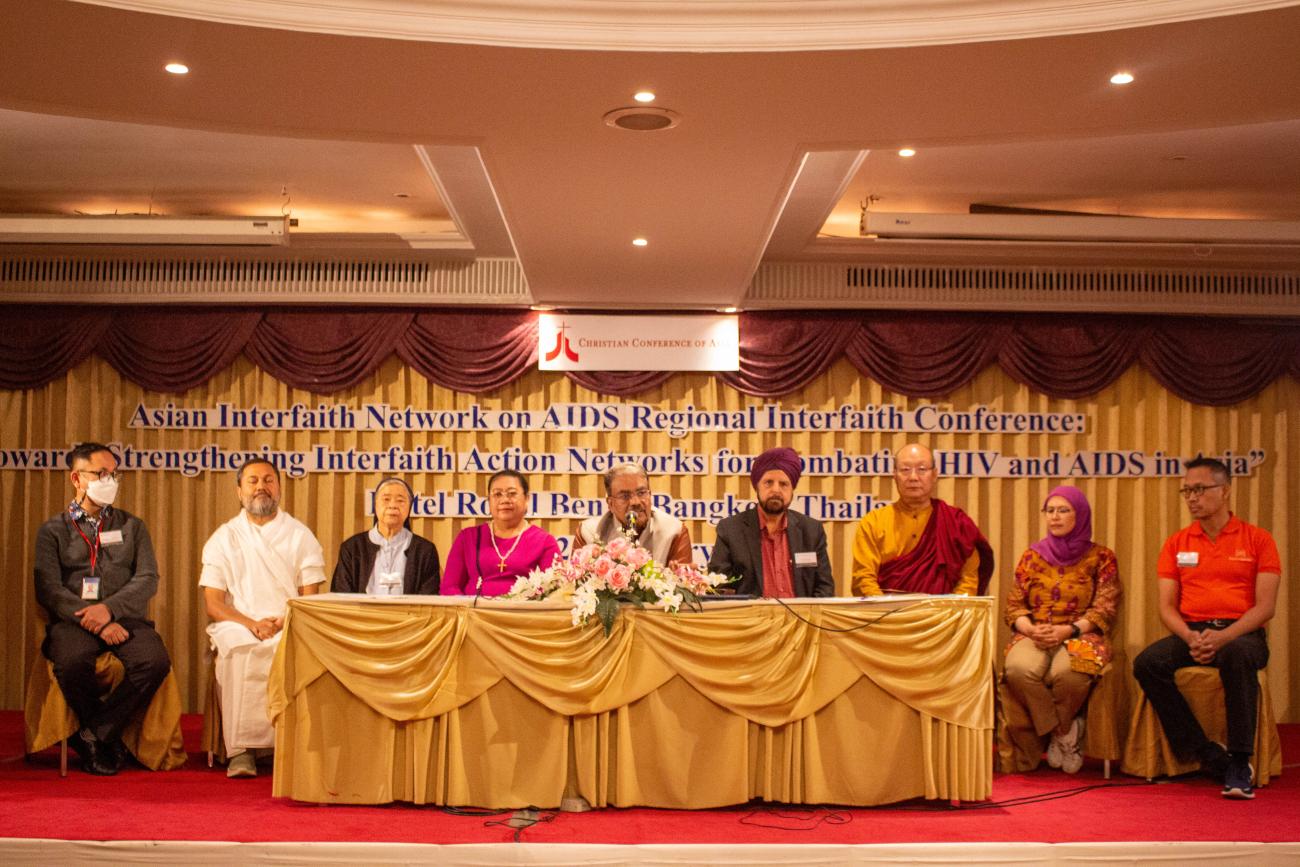CCA facilitates revitalisation of Asian Interfaith Network on AIDS

CCA General Secretary Dr Mathews George Chunakara speaks at the closing session AINA Conference held in Bangkok.
From left to right new Steering Committee members: Dr Ronld Lalthanmawia, Swami Atmmananda, Sr Mercedes Ruz Placino, Bishop Feliciana P Tenchavez, Frank Sethi, Ven. Lam Ngodup, Dr Citra Fitri Agustina, Aan Sasono Rianto
Bangkok, Thailand: The Christian Conference of Asia’s (CCA) initiative and facilitation to revive the activities of the Asian Interfaith Network on AIDS (AINA) in more vigorous ways led to the formation of a new steering committee to evolve strategies for wider advocacy measures through faith-based organisations in Asia.
The three-day regional conference that concluded on 25 January 2023 appointed new members to the steering committee, consisting of Ven. Lam Ngodup (Buddhist), Bishop Feliciana Tenchavez (Christian), Sr. Mercedes Ruz Placino (Christian/Roman Catholic), Swami Atmananda (Hindu), Dr Citra Fitri (Muslim), Frank Sethi (Sikh), Aan Sasono Rianto (Christian/PLHIV), and Dr Ronald Lalthanmawia (CCA ATCHAA Programme Coordinator).
While expressing appreciation and thanks to the Asian religious leaders for their sustained interest and commitment to combating HIV and AIDS in Asia, the CCA General Secretary, Dr Mathews George Chunakara, assured CCA’s support to the new leadership of AINA and reiterated the Asian churches’ commitment to accompany the network in its efforts to fight against HIV and AIDS in the region.
The CCA General Secretary added that the motivating factor for all religions and faith-based groups in Asia to come together on a common platform such as the AINA was our concern for all of humanity, irrespective of religious or ethnic identities.
Dr Mathews George Chunakara further recalled the contributions of the outgoing leadership team of the AINA and emphasised the need for revitalising and strengthening the national networks part of the AINA in the coming months.
A revised Memorandum of Understanding (MoU) was adopted at the closing session of the Conference. As per the MoU and the affirmation by the representative group consisting of religious leaders from different Asian countries, CCA was mandated to continue the coordination of the AINA from CCA headquarters in Chiang Mai, Thailand. The Programme Coordinator of the CCA’s HIV and AIDS Programme (ATCHAA) would oversee the coordination of the AINA with the assistance of other CCA staff in the ATCHAA team.
In a statement, the participants expressed their commitment to understanding and upholding the role of faith- and religion-based organisations in Asia by working with people infected and affected by HIV, as well as advocating, educating, and mediating for HIV prevention, testing, treatment, and care.
It was also stated that faith leaders and communities should be willing to identify common themes and reinterpret interfaith teachings in new ways that could address challenges related to stigma and discrimination against people infected and affected with HIV.
Concerning the call to adapt to changing times and to actualise responses to the AIDS pandemic, participants pledged to use their time, talent, technology, and tenacity to collaborate and embrace individual and organisational strengths, as well as to use media resources, including social media networks, for sharing information and for mobilising actions.
Dr Ronald Lalthanmawia, Coordinator of CCA’s ATCHAA programme, outlined the ATCHAA activities of the CCA and welcomed the involvement and activities of AINA networks at national levels. He urged those in leadership at the national level to engage in advocacy together with CCA member churches and national ecumenical councils.
The Asian Interfaith Conference on ‘Towards Strengthening Interfaith Action Networks for Combating HIV and AIDS in Asia’, held from 23–25 January 2023 in Bangkok, Thailand, concluded with an interfaith closing prayer service. Sixty participants including faith leaders from major religions, namely, Buddhism, Christianity, Hinduism, Islam, and Sikhism, as well as representatives from UNAIDS and faith-based organisations working in the field of HIV and AIDS from across Asia, attended the Conference.











